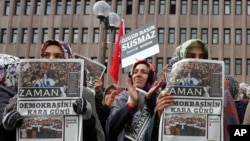Turkey's government is facing growing international pressure following police raids on media establishments. But the Turkish president has dismissed criticism and said the country’s national security is at stake.
Turkish President Recep Tayyip Erdogan said there would be no let-up of police probes against followers of Islamic cleric Fethullah Gulen, who he accuses of seeking to overthrow the state.
Erdogan strongly defended Sunday’s police raids on the Zaman newspaper and Samanyolu TV station.
He said, "Elements who threaten our national security will receive the necessary treatment, even if they are members of the press."
The Turkish president went on to say that purges within the judiciary would still be needed to remove what he called traitors.
Erdogan blamed followers of Fethullah Gulen within the judiciary and police of being behind corruption probes launched last December implicating Erdogan family members and senior ministers.
The Turkish leader said Gulen, supported by media interests, was trying to remove him from power - a charge the cleric strongly denies.
Gulen lives in self-imposed exile in the United States. He once was a close ally of Erdogan before a falling-out over government plans to shut schools operated by the cleric's Hizmet movement.
The crackdown on media establishments drew criticism from Turkey’s Western allies. U.S. State Department spokesperson Jen Psaki said media freedom, due process and judicial independence are key elements in every healthy democracy. She said Washington is watching events closely.
The EU, in a strongly worded statement, said the media raids were incompatible with European standards and values. Ankara has long sought to join the EU and earlier this month a high-level EU delegation visited Turkey to revitalize the membership bid, which has stagnated in recent years.
One of the factors in the delay is concern over media freedom. But Erdogan dismissed the EU criticism, saying Brussels should mind its own business, adding that Turkey has been waiting 50 years to join the bloc.
Diplomatic columnist Semih Idiz of Turkey’s Taraf newspaper and Al Monitor website said the president’s reaction revealed the limited influence the EU now had over Ankara.
"The rather reluctant position that some countries have had over the past 10 years towards Turkey’s membership, with some just openly blocking its path, I think that has led to this sort of notion no matter what Turkey does, its bid will never move anywhere else," said Idiz.
Analysts said the crackdown on Gulen supporters was likely to intensify.
Emma Sinclair Webb of New York-based Human Rights Watch pointed to a Turkish law which came into force this month.
"The law I would say is about those who the government perceives to be close to the Gulenists. It's all about seizing assets, it's all about coup plot charges, widening the powers to seize property and search premises when there is a kind of coup-plotting charge at stake. And that, as we know, that is exactly the charge they want to use against Gulenists," said Webb.
Analysts said with Gulen followers believed to number in the millions and having major business interests and presence within the Turkish state, the country is likely to see many more police raids and arrests.





